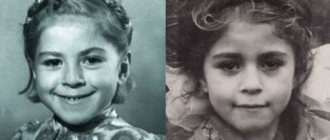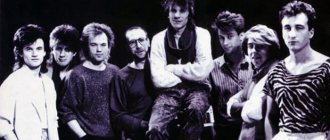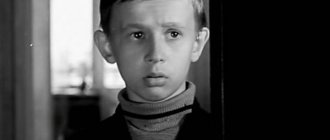Childhood and youth
Igor Pavlovich Grigoriev was born on October 21, 1966 in Taganrog. His mother, a 17-year-old girl, left the child in the maternity hospital and ran away, and after 2 weeks the boy was taken by his adoptive parents. Igor was taken to the village of Lakedemonovka in the Rostov region. The boy later learned that his biological mother may have been a gypsy, and his father an aircraft tester.
Musician Igor Grigoriev
The adoptive parents were peasants and did not tell the boy the truth about his origins - he found out all this on his own. At first I listened to the gossip of the village grandmothers, then I found in the closet old newspaper clippings telling about the adoption procedure. He finally learned the truth before leaving for the army, and it was not his mother who told it to the young man, but his teacher.
Igor served in the army in the air defense forces, in secrecy - some of them accompanied military aircraft carrying out flights of high importance. In an interview with Natalya Sindeeva in March 2018, the musician admitted that for 2 years he had neither a first nor a surname and his name was Paster-44.
Igor Grigoriev in his youth
After the army, Igor thought about continuing his military biography and went to enroll in the Kiev General Arms School - he wanted to become a scout. However, what he saw before the entrance exams was the life of the cadets made the young man disappointed in his choice, so he deliberately failed the exams.
After this, Grigoriev entered the Taganrog State Pedagogical Institute at the Faculty of Foreign Languages, but in 1987 he decided to move to Moscow. There, Igor entered MGIMO and studied with a specialization in Thailand and the Thai language.
Igor Grigoriev
As a member of the MGIMO Komsomol committee, student Grigoriev had the opportunity to organize concerts on the stage of the institute’s assembly hall. Thanks to his support, Bravo, Igor Talkov and other semi-official performers and groups performed there at that time. His acquaintance with Zhanna Aguzarova helped him finally join the circle of music show business.
In 1988, Igor, in addition to his studies, began to work seriously - he became the concert director of the singer Irina Ponarovskaya.
Biography
He arrived in Moscow in the summer of 1987 and entered the Moscow State Institute of International Relations as a full-time student at the Faculty of International Relations (specialization - Thailand and Thai language).
Igor Grigoriev photography
As a student and a member of the institute’s Komsomol committee, he organized concerts of semi-legal Soviet groups.
Bravo, Brigada S, Igor Talkov, Sergei Penkin performed for the first time on the stage of the MGIMO Assembly Hall. There he met Zhanna Aguzarova, who helped him enter the circle of show business at that time. Advertising:
Since 1988, he began to combine his studies with work as a concert director for Irina Ponarovskaya.
In 1991, he left his studies at MGIMO and work in show business for the sake of journalism.
His ascent in journalism began in September 1991 with the publication in the newspaper “Krestyanskie Vedomosti” of an article about actress Tatyana Samoilova, who by that time was in complete oblivion.
The article had a wide resonance, after which Igor accepted an offer from the weekly Argumenty i Fakty to take the position of editor of the culture department.
As an editor, Grigoriev published sharp interviews (Boris Moiseev, in the interview “I Love Rich Men,” openly declared his sexual orientation for the first time) and covered the new alternative culture emerging in the country.
Since 1993, he has been writing a column in Novy Vzglyad.
Best of the day
| John Argyropoulos Visits:274 | Polina Vitorgan Visited:271 | The last Russian emperor Visited: 265 |
In 1993, he met show businessman Boris Zosimov, with whom he published Russia’s first thick glossy magazine, Imperial. The magazine served as the starting point for the era of glossy journalism in the country.
After several issues were published, he left Imperial and in 1994 headed Russia’s first glossy magazine for men, Amadeus.
Career. OM Magazine (1995-1998)
In May 1995, he began working on the OM magazine. The publication of the magazine in November 1995 became an event in the Russian periodical press market. For five years in a row, the magazine was awarded the title of the best magazine of the year as assessed by fellow journalists (Professional Music Media Award “Quality Mark”). In 1997, the magazine was awarded the National Ovation Award in the category “Best Magazine of the Year”.
In November 1998, Grigoriev resigned as editor-in-chief of the magazine, explaining the reasons for his departure in his last editorial letter. His planned departure from the magazine in the spring coincided with the severe economic crisis that broke out in the country.
Career. Various (1998—2008)
Policy
In December 1998 he founded the All-Russian public political movement “Generation of Freedom”. At the Founding Congress he was elected Chairman of the Movement Council. The Movement considered the main goal of its activities to be working with young people and promoting democratic and liberal values, as well as the non-political, worldview association of the new generation on the principles of perceiving freedom as the highest value. The movement united both young politicians who previously belonged to different political blocs, and young cultural figures showing interest in social and political activities. In December 1999, the Movement became part of the “Bear” association; three candidates from the Movement were elected deputies of the State Duma of the third convocation. Igor Grigoriev himself leaves the movement due to a conflict within the management elite.
In May 1999, Igor Grigoriev settled in the city of Prague. He was a co-owner of a small cafe in the city center, which became a place of informal meetings for employees of Radio Liberty.
TV and cinema
In 1999, he returned to Moscow at the invitation of the general producer of the TV-6 channel, Ivan Demidov.
In May 2000, the channel began airing a weekly information and entertainment program, “Saturday Night Fever with Igor Grigoriev.” The program remained on the air until November 2000.
After leaving television, Igor made films, wrote scripts, and made videos for Russian performers. Among Igor Grigoriev’s famous works as a director are videos for Dmitry Malikov (“Beads”) and the group “Mumiy Troll” (“Go, I’ll Be”).
In March 2003, he began filming the television series Twin Twix based on his own script. The “pilot” of the series received rave reviews from professionals. Director Andron Konchalovsky compared Grigoriev's film with Tim Burton's film Beetle Juice and agreed to produce the series for the NTV channel. The then head of the channel, Nikolai Senkevich, signed a contract with Grigoriev for ten episodes. In narrow cinematic circles, a copy of the “pilot” episode of the film is still in circulation.
Reanimation of the OM project
In 2003, Igor made an attempt to revive the OM magazine and returned to the chair of editor-in-chief. This attempt was unsuccessful. In September 2004, the last issue of the magazine was published, on the cover of which was a portrait of the “tortured and mutilated” Philip Kirkorov with the message: “We will all die one day.” After some time, the magazine was finally closed as unprofitable.
In 2005, Igor Grigoriev, together with the general producer of Russian Fashion Week, Alexander Shumsky, produced the first Russian National Award in the field of fashion and style, “Astra”.
In 2006 he left Russia and settled in Rio de Janeiro. From June 2006 to May 2010, under the pseudonym tchatski, he kept an online diary in which he published reports about his travels.
New stage. Music (2008 - present)
In 2008, after a ten-year break, Igor Grigoriev returned to active creative activity with a musical project, the idea of which he had been nurturing in recent years. Igor founded the Black & White Orchestra (BBO), a musical group that performs famous jazz works in modern, unexpected arrangements. Grigoriev is characterized by a specific hoarse voice, a decadent image on stage, and broken choreography of movements. Grigoriev himself defines the genre in which he performs on stage as “indie cabaret”.
The first performance of the ChBO took place on September 7, 2008 at the opening of the Eurasia International Film Festival in Astana in the famous “pyramid” of Norman Foster - the Palace of Peace and Reconciliation. The presentation of the orchestra with the program “Third Live / When I was 21” took place on October 21, 2008 in Moscow.
In November 2008, Igor signed a contract with the agency City Concerts International Artists, specializing in concert activities of foreign artists in Russia, becoming the first and only Russian performer on the agency's roster.
In December 2008, Igor Grigoriev disbanded the Black & White Orchestra and began a solo career.
In January 2009, Igor Grigoriev, while in Rio de Janeiro, met the outstanding Brazilian saxophonist, composer and producer Leo Gandelman and recorded several songs for his album at his Zaga Music Estudios studio. In October 2009, performances by Igor Grigoriev accompanied by the Leo Gandelman band took place in Moscow and St. Petersburg as part of the IV International CityJazz Festival.
In September 2010, the Internet portal OpenSpace.ru presented a special project “Igor Grigoriev in Open Space”, in which Igor Grigoriev announced the upcoming release of an album of his own songs and announced the release of the first single “Dreams of My Spring” in the fall of 2010. The release of the single was later postponed to spring 2011.
On November 22, 2010, the debut video for the song “Dreams of My Spring” premiered. For 10 days in a row, the video clip was in the top five of the most viewed videos on Russian YouTube. The Komsomolskaya Pravda newspaper named the video clip “Dreams of My Spring” the clip of the year.
On February 22, 2011, the international premiere of the song “Dreams of My Spring” took place at the pre-Carnival ball in Rio de Janeiro, accompanied by Orquestra Imperial. Thus, Igor Grigoriev became the first Russian artist to take part in the official program of the Carnival in Rio.
In April 2011, he released his second official video for the song “Tango”, written to the poems of the Oberiut poet Alexander Vvedensky.
In June 2011, Igor Grigoriev’s first performance with the orchestra took place on television in Alex Dubas’s program “Moments” on the Dozhd TV channel.
Some biographical facts
Two days after birth, he was abandoned by his mother in a maternity hospital in the city of Taganrog and adopted by new parents at the age of two weeks.
After school, he entered the Kiev Higher Combined Arms Command School to major in intelligence.
Married to Kuatbaeva Aiken Kunsainovna, a film producer.
In 1997, he starred in the leading role of Vampire in Lika’s video clip “Lonely Moon”.
In April 2008, he starred in a cameo role in the film adaptation of V. Pelevin’s cult novel “Generation “P”,” directed by Victor Ginzburg. The film was released in the spring of 2011.
In December 2008, through his blog on LiveJournal, he announced the end of a journalistic career that lasted 17 years.
In March 2009 and March 2010, GQ Russia magazine twice included Igor Grigoriev in the top ten most stylish men in Russia.
Best weeks
| Rich and famous Visits: 996 | A man's beard decorates him Visited: 1064 | Margaret Douglas Visits:1005 |
Politics and creativity
In 1991, studies finally ceased to interest him, and Grigoriev, becoming interested in journalism, left the institute.
Igor’s first publication talked about Tatyana Samoilova, the legendary actress, whom no one remembered at that time. The article caused a sensation, and Grigoriev was invited to work as editor of the culture department at the weekly Argumenty i Fakty. One of the achievements in this position was an interview with Boris Moiseev, which in 1992 was considered a “coming out”. However, the text of the article never mentions homosexuality, and Moiseev himself later repeatedly denied rumors about his gay orientation.
Journalist Igor Grigoriev
In the early 1990s, Grigoriev also worked at Novy Vzglyad, Imperial and Amadeus, until in 1995 he began to work closely on the publication of the OM magazine. The publication won success among Russian readers and in 1997 received the Ovation Award as the best magazine of the year.
In 1998, Igor left the post of editor-in-chief of OM and entered politics, organizing the Generation of Freedom movement. The organization planned to work with young people, promote liberal values, and a year later became part of the “Bear” association. At this stage, Grigoriev left the movement due to disagreements with his comrades-in-arms and went to Prague, from where, however, he soon returned to Moscow.
Igor Grigoriev
In the 2000s, the man worked on television - he hosted the program “Saturday Night Fever with Igor Grigoriev,” directed, shot videos, and wrote scripts. In 2003, he even tried to film the TV series Twin Twix, the pilot episode of which was highly praised by his colleagues, but the project did not have enough funding.
In 2006, after trying to revive OM and participating in the creation of the first Russian fashion award, Igor went to Brazil, to Rio de Janeiro. 2 years later, in his blog on LiveJournal, the man wrote that he was finally leaving journalism.
Sobchak, Sokolova and Igor Grigoriev
Sobchak Igor, what an irony of fate! You were one of the first to interview me. It was many years ago in a cafe on Novy Arbat on the second floor.
Grigoriev I remember the name. "Sunrise".
Sobchak This was one of the first interviews with me, very good. Less than eight years have passed, and circumstances have changed dramatically.
Sokolova Who interviewed you?
Sobchak As it girl of Moscow.
Sokolova Alas, now you have gone from being an it girl to a working girl, and Grigoriev has become a star.
Sobchak What were you doing in those blessed times?
Sokolov I was not in the country in those days. But a little earlier, I often went to the Ptyuch club, with which I, Igor, for some reason associate you.
Grigoriev No, what are you talking about, “Ptyuch” was a completely different world.
Sobchak We just wanted to find out from you, Igor, which world is better. You have lived in different worlds. I know only one of these people, in terms of the steepness of life changes - Vanya Okhlobystin.
Grigoriev I know a cooler example. The chief conductor of the Berlin Orchestra (he is now 70 years old) used to head the management of Sony. He was a businessman, but began to study music. Such a somersault.
Sobchak What made you suddenly change professions?
Grigoriev I don’t know if there is a pattern. I am a person raised in the Soviet Union, in the village. I was adopted from a maternity hospital. In general, I am a reflective psycho.
Sokolova Are you really adopted?
Grigoriev in Taganrog. I was two weeks old when my mother abandoned me. I knew that I was adopted. Maybe that's what it's all about. The unloved need a lot of love. The stage gives it. But unlike most of my colleagues, I am terribly afraid of the stage, I almost feel paralyzed. Although I know, for example, that Philip Kirkorov receives aesthetic pleasure from being looked at.
Sobchak , just in a different form.
Grigoriev I am apparently overcoming colossal complexes.
Sokolova I read reviews of your videos “Tango” and “Dreams of My Spring”. The reviewer writes: what you are doing is not bad, but narcissistic and provincial.
Grigoriev Neither one nor the other is true. “Tango” based on Vvedensky’s poems is criticized for everything in the world - for narcissism, derivativeness, decadence. At first this hysteria amused me, then it began to irritate me.
Sokolova I was a little surprised by the inadequacy of the reactions. What you do is parlor music, quite nice. What could be so annoying about her?
Grigoriev I really really want to be liked, because if I didn’t want to, I wouldn’t bother going anywhere.
Sobchak I even know why! I have the same problem. I advise you to go online in the evening, type “Gannushkin” and “hysterical personality type.” It turns out that all people who want attention, all who speak in public, are of the hysterical type.
Grigoriev This applies to people who are out of the system. You just live, sit quietly in a dark corner, but still irritate. Still, someone looks into a dark corner because the “vibes” come from there. I noticed this many times when I was still studying at MGIMO. I wanted to be nice, I stopped walking gloomily and looking from under my brows, and began to smile. Then everyone started saying: “He fucking looks like he’s blessed.” I wanted people to like me. But people reacted to me as if I were a foreign body.
Sokolova Why?
Grigoriev This may sound smug and wild, but sometimes I feel a shaking that descends on me from heaven.
Sobchak In the form of anxiety?
Grigoriev In the form of energy. This is how the music I recorded came to me. I wanted to write this music, but it didn’t come to me for a long time. It came when there was a moment of not even despair - you feel despair and fight - it was a moment of hopelessness, a low point, at that moment music began to come to me in terabytes. I thought: who writes this? Me or someone else? Something just turned on. I am aware that it can also turn off. Look how many talented people are switched off. You look, it’s like the same person, with the same eyes and nose, but nothing else... I’m a mystic in this regard. I admit that I am a kind of guide. One day they just tell you: guy, you’re ready, it’s on you. What can I say? Oh, thanks.
Sobchak doesn’t scare you that no one really understands who Igor Grigoriev is? Journalist, musician? Who are you anyway?
Grigoriev Werewolf.
Sobchak Do you like this role? Or would you like to become a famous singer in ten years?
Grigoriev I will contribute to the music.
Sobchak Despite the huge number of advantages that the werewolf position has, it has a significant drawback. You never reach the top of anything.
Grigoriev I wouldn't say that. At the first stage, when I created and was the editor-in-chief of the magazine “OM”, I still reached some kind of peak. Your column, for example, is my creation. This genre was called chill-out in OM, and it appeared in 1996.
Sokolova What genre?
Grigoriev The genre of table conversation with all the interjections is natural, as it flows.
Sokolov The genre of natural conversation appeared in American journalism in the 40s. Alas, the palm here does not belong to us.
Grigoriev It is quite possible that Capote spoke the same way. In 1995, I didn’t know who Truman Capote was, I didn’t know many things, and I began to make this genre, inspired by the power of the late Yuri Aizenshpis, whom we crap in one of the issues. I wrote that in the person of Vladik Stashevsky, the world has lost an excellent head waiter. A mutual friend called me and said: a team with baseball bats is gathering in your direction. You better call him. I came to him. He says: well, let’s make a refutation, write an article about Stashevsky. I understood that Vlad, despite all my likes and dislikes, did not fit into the magazine format, so I came up with this genre. For example, you stuff unconventional characters into GQ. I was also able to talk in chill-out with Zverev, with Stashevsky and with people who would never appear on the pages of a magazine where the conversation was “serious”.
Sokolova I call this “dissecting frogs.” Okay, let's say you did it first.
Grigoriev I did it first, journalists talked about it. This is about the question of whether I reach the top.
Sokolova If you had reached the top, you would now be a local newspaper magnate.
Grigoriev or Ernst.
Sobchak Or at least Nikolai Uskov. Figuratively speaking, the editor-in-chief of an important publication.
Sokolova No, with such a background - only a tycoon. Where is Uskov?
Grigoriev (with suspicion) Will you leave all this in the interview?
Sokolov out. Although... we are joking with you.
Grigoriev You are trying to put me in a standard box, where there is a place for a career, promotion... I have never done this.
Sobchak It seems to me that a person feels calm when he knows for sure that he has a craft that will feed him in any situation. And when it is blurred, there is a feeling that there is no history of the case. In my opinion, this is very difficult to live with.
Grigoriev It’s not hard for me at all. If it were up to me, I wouldn't do anything! Money is the most important pusher. Or rather, their absence. In 12 years of traveling around the world and across different spheres, I’ve done everything!
Sokolova Tell us, we are interested.
Grigoriev I left journalism in 1998, settled in Prague, did nothing. Then he opened a cafe and worked as a bartender.
Sokolova Did you have money?
Grigoriev Yes, I made money on Om. We had a circulation of 100,000, which was unthinkable for 1997–1998, and even now it’s very cool. This suggests that something strange has happened to the country. Why was this culture that we are discussing so in demand then? And now, even if this magazine came out, Mumiy Troll or Zemfira appeared, it’s not a fact that they would be interesting to anyone.
Sokolova Absolutely correct. Degradation is ongoing.
Grigoriev This is very strange. I started searching for myself because I didn’t want to return to journalism. But then there were defeat after defeat.
Sobchak What kind of projects were these?
Grigoriev I shot, as a director, a feature film. Figuratively speaking, I myself put the film on the shelf because I realized it was bad. Then he organized a party and brought several idiots into the Duma of the fourth convocation. Produced the Fashion and Style Award. He hosted a program on the federal channel at the invitation of Vanya Demidov. Started writing a book. I returned to OM for the second time. Opened a business. No matter what I did, nothing worked!
Sokolova Were these objective failures or were you simply not satisfied with the results?
Grigoriev I made every effort, but every time it was the same. I stamped the mark of a loser on my forehead. This is actually a serious thing. After 12 years, I came to a catastrophic state and began out of despair... to sing. It all started like this. Once I sang karaoke with friends, renting a VIP room. Friends, including many of our mutual acquaintances - from Andrei Fomin to Alena Sviridova and Lada Dance - said: why don’t you do this publicly? You can do it! It’s not you who will pay for the VIP room, but you will be paid, and you will have a larger audience. I didn't take it seriously until the money ran out.
Sokolova Oh, this is a very effective moment!
Grigoriev If it weren’t for this, I wouldn’t be here now.
Sokolova Thank you for your sincerity. Where would you be?
Grigoriev Would travel. It's never boring.
Sobchak During this search for yourself, were you interested in any teachings or practices?
Grigoriev I am an experimenter. My most serious experience was two years ago when I drank ayahuasca in Rio de Janeiro. Ayahuasca is a decoction of the caapi vine, or “death vine,” which grows in the Amazon. In Brazil, the Heaven and Sea Church was even created around this cause.
Sokolova What is the “liana of death”?
Grigoriev This is tea. That is, they call it tea. You drink the decoction, and it has such an effect that the person actually experiences his own death in reality. The feeling is most powerful. It was as if I died, not physically, but I understood what death is. At some point you realize that no one will help you. You are alone. You are still within yourself, you understand that you can take this cup, touch it, but you feel that it no longer belongs to you, like no other point in this reality. This is a disaster, this is wildly scary! You don’t understand where you are, but you are no longer here.
Sobchak When you pass this point, do you stop being scared?
Grigoriev I didn’t vomit, I didn’t physically die, but I had such colossal fear that I didn’t go for the second procedure. I wanted to escape from her, although they assured me that they would not torture me anymore.
Sokolova Did they physically return you?
Grigoriev I did not have any hallucinations. This lasts three hours, then you slowly return. I immediately flew to El Salvador.
Sobchak You didn’t do the second procedure?
Grigoriev In El Salvador, in the quietest bay where there are no waves, this same vine-wave reached me. I entered the warm sea, calm and shallow. At that moment I saw that the water was rolling back and bare sand appeared. I turned towards the sea and saw a wave, a single, small one. This phenomenon is called a rogue wave, and it happens very rarely. Megatons of power grabbed me and slammed me into the bare sand, so that my left arm was literally torn out. She was hanging. The most difficult fracture. This vine wave caught up with me. So the sensations experienced during that procedure, when you are a sliver, a nobody, were repeated in reality. You asked whether there is any point in continuing to do procedures. Probably, there is, but only if you really delved into some serious areas. At one time I was very touched by the Moscow ladies who studied Kabbalah; to be honest, I don’t remember them going anywhere far, because this is a big responsibility. You can get hit hard on the head.
Sokolova I have a friend who experienced several clinical deaths. He served in the Foreign Legion and was seriously wounded. Has undergone several operations. He says that every time he died, he felt the same thing: incredible relief when thousands of complex systems that work inside you finally receive a signal to shut down, to stop producing energy. And they gradually turn off, which causes an incredible feeling of relief. He described it as euphoria, an incredible high.
Sobchak Eduard Sagalayev also told me very interesting things. He said that he was terribly afraid of death and came to some great teacher in India. He came in and said: “Teacher, I came to you because I’m afraid of death.” And he told him: “Then die now.” He felt that he had died, fell, lost consciousness, but thanks to this Hindu he found himself in such a state that he understood death and really stopped being afraid. When you know this mystically, fear goes away.
Grigoriev I think it’s scary anyway. One day I was shaking so hard on a plane that I thought it was the end. Although I understood what this death looks like.
Sobchak What kind of people need all these eastern practices and mysticism?
Grigoriev Of course, sick. My spiritual experiences ended a long time ago. Apart from ayahuasca, I have wanted to try it for a long time. It was funny when Kirill Serebrennikov and Andrei Fomin came to visit me in Nepal. I lived there briefly about three years ago. When they performed rituals around the temples, it was interesting to watch. No healthy person, confident that everything is fine with him, will go there. Look who comes to church - people with problems. Those who travel to the Himalayas are people with big existential problems. Shahri Amirkhanova flew there at one time, I don’t know if she came out of a tailspin.
Sobchak Came out, I just met with her two days ago. But it seems to me that these are not patients, but simply people with a vulnerable soul, with a special fiber, hypersensitivity to everything that happens. Thick-skinned people do not care about these problems; they have an ideal nervous system.
Grigoriev I call them the owners of thick layers of subcutaneous fat. You know, like pigs have lard. Living with lard is much more comfortable. If you have human skin, it is generally difficult to live in the world, but there are not very many such natures.
Sokolova It happens when there is no skin at all.
Grigoriev There are only a few of these. And with “human” skin – 10–15 percent of the total.
Sobchak By and large, these people are the creators who create and move the world.
Grigoriev In an amicable way, you need to answer two questions globally: who are you and why are you here? If you receive specific answers to these questions, you can quit spiritual quests forever. This happened to me in Nepal. One lama told me. Then there were different people at the meeting asking him questions, but I didn’t ask anything. I actually already left there. He said: why are you silent? Everyone comes to me for an audience with questions. I say: I have no questions. And he: so you’ll be late. Everyone left, we were left alone. I say: everything is clear to me, in principle. Well, maybe it’s not clear why they insult me in the press, calling me a faggot...
Sobchak Are you hiding your sexuality?
Grigoriev I never hid it and never advertised it. I'm calm about this.
Sokolova Let's leave the orientation, is it clear to you?
Grigoriev I told him: it is clear to me that no teaching, no search, no road is worth anything if at the end of the road you simply do not take the old woman’s hand and lead her across the road. If you don't do this, why bother?! This is the whole point. This, by and large, is love as the antithesis of selfishness. While we are small, growing up, we say - give me this and that, but at some point the time comes to give, this is a natural process, but not everyone understands this.
Sobchak It's not natural for everyone.
Grigoriev I have long caught myself thinking that I get tremendous pleasure from giving. If I had money and didn't have to make money from music, I would travel. I remember my trip to the Himalayas exclusively through the eyes of the old women who live there. There are always sandstorms in the Himalayas, and older women get conjunctivitis. And here we come, the big white men, stocked with Visine. I poured Visine into their eyes there. I was the big white doctor who arrived in a helicopter. I remember their grateful eyes. I don't remember anything else. I feel incredibly sorry for the old people thrown away by their children, the system, the state. I have a dream. Ideally, I would build a nursing home and do everything there myself. Maybe not every day, but sometimes for sure.
Sokolova In the meantime, we have to play music.
Grigoriev For now. You know, as Louis Malle said: “I would never have made films if it weren’t for my lack of money.”
Sokolova It’s sad, but it turns out that often for a creator, lack of money is a blessing, an incentive.
Sobchak You know, Igor, I love your music - you even performed at my birthday, but it seems to me that it is in some 148th place for you. I think you are much more than your songs. Maybe this will sound offensive.
Grigoriev I have nothing to cover now, because I only have two songs released in the form of videos. You've heard one of them. However, I know that now I am the main musician of this country.
Sobchak Yes? And Zemfira? "Mummy Troll"?
Grigoriev After Zemfira, no new universe appeared. Zemfira was the last universe, it appeared in 1998.
Sokolova Does your universe appear?
Grigoriev I know that I am the universe.
Sokolova And are you able to convey this feeling to those who listen to you?
Grigoriev In condition. I take two to three years to prove it, for the carpeting of this country I take five years. I'm not in a hurry, because at my age there's no time to rush.
Sokolova Well, no one pulled your tongue. You promised - do it. Although, as far as I can tell, your genre is difficult for mass perception. For example, Zemfira has the most powerful energy, expressed in fairly understandable forms. Your forms are intricate and you don’t have this power. How are you going to cover the country of the winning chanson?
Grigoriev What do you mean by power?
Sokolova Strong energy release, pressure. Zemfira has it, you can’t even make out the words. It just hits you when you hear it. You have a complex genre...
Grigoriev Yes, I don’t think it’s difficult! In fact, this is Russian folk. Here's the "Tango" you heard. I equally imagine tango sung by a singer from the stage or a lesson - on a plank with a guitar. It's all simple.
Sokolova Still, outline your plan-dagger of advancement to the musical Olympus. I like it when a person says confidently – I’m the best here! But I want to know the details.
Grigoriev I have a clear picture of what I would like to get in five years.
Sobchak And what is this?
Grigoriev I would like to settle in my hacienda in Brazil, a country that I sincerely love, which I consider my first homeland. Get a bunch of different children, beat them around with a whip, educate them.
Sokolova Looks like the dreams of a pedophile.
Grigoriev Not at all! I would really like to raise children. With money and commissions received from RAO for performing my songs in restaurants and karaoke.
Sobchak That is, they will no longer sing Krutogo there, they will sing you.
Grigoriev And Krutoy, and me too.
Sobchak That is, the repertoire is as follows: “Cabriolet” by Lyubov Uspenskaya, then you, then “I love you to tears.” Do you really want to join this row?
Grigoriev I think so. I don't see any strong contradictions. “Dreams of My Spring” is actually a pop song. In a good way.
Sokolova Why do you want to go to Brazil?
Grigor ev This is my homeland. Real.
Sokolova I understand you. I was there. Rio changed my entire outlook on life.
Grigoriev How so?
Sokolova What shocked me most was the seemingly obvious thing - how climate determines human life and death. In Rio, I saw people, ragamuffins, spending the night on the beach. All the beaches there are public. In the morning, these beggars collect empty beer cans, hand them over to special points, receive some pesos and use this money to buy more beer! For food - coconuts, dates, everything grows overhead. The world is totally friendly! A man sleeps on the beach, he can’t freeze or die from hypothermia, and he doesn’t need money. In the city where I grew up, if you were drunk and fell asleep on the street in winter, you would most likely die. At that moment, this simple discovery shocked me. Fundamentally different life philosophies are built on this climatic difference. Opposite systems of life. Another facet, another threshold of death.
Grigoriev Yes, God and nature were merciful to this piece of land, unlike Moscow.
Sokolova Living in a cold climate, at some point you realize that you are not God’s chosen one, a second-class person.
Sobchak On the other hand, a bad climate is an incentive for creativity, as is lack of money.
Sokolova It seems, but not for one particular country.
Grigoriev There is colossal vitality in South America. They respond to God and this world's kindness with love of life. You painted this picture very accurately.
Sokolova Just to get into the world of sparkling idleness, you need to work.
Photo: Ivan Kurinnoy
GQ magazine would like to thank Nobu restaurant for its assistance in filming.
Photo: GQ
Do you check your email often? Let there be something interesting from us.
Music
Grigoriev turned to musical creativity back in 2008, organizing the group “Black and White Orchestra”, whose performances took place in the style of a decadent cabaret. In 2009, after the dissolution of the band, Igor performed on the stage of the CityJazz festival with the group of Brazilian saxophonist Leo Gandelman.
Song by Igor Grigoriev “Dreams of my spring”
A year later, the musician began solo work, announced his upcoming album and released the single “Dreams of My Spring,” the video for which in 2011 became one of the most popular in the Russian segment of YouTube. The bright, openly satirical video, according to Komsomolskaya Pravda, became the video of the year.
In February 2011, having presented “Dreams of My Spring” in Rio de Janeiro, Grigoriev became the first representative of the Russian stage to perform in the program of the Brazilian carnival.
Igor Grigoriev and Lyubov Uspenskaya in the show “Two Stars”
The musician also took part in the 4th season of the “Two Stars” project, appearing on Channel One in 2012 in a duet with Lyubov Uspenskaya. The couple was liked by spectators and journalists, but was rejected by Viktor Drobysh, who was one of the jury members. Since Drobysh deliberately underestimated the duet’s ratings, special rules were introduced according to which not a single couple could leave the project before its end. This guaranteed the continuation of performances by Grigoriev and Ouspenskaya, who would otherwise have dropped out of the show.
In 2013, Igor released his first full-length album, “Cornucopia,” which already on the first day entered the top 10 best-selling albums in the Russian iTunes segment. The songs from “Cornucopia” included many genres - from outright rock in “Stupid Love” to psychedelic “My Love.”
Song by Igor Grigoriev “My Love”
There was also a place in it for folklore motifs - a classic example of this is the song “Gypsy”. The presentation of the album, which was later named by Afisha as one of the 25 best records of the year, took place on the stage of the Gogol Center.
In 2020, the musician released the mini-album “Dark Corner”, which was supposed to be the predecessor of the second full-length disc “Sofomor”. The release was planned for 2020, but never took place.
Career. Various (1998—2008)
Policy
In December 1998 he founded the All-Russian public political movement “Generation of Freedom”[11]. At the Founding Congress he was elected Chairman of the Movement Council. The movement considered working with young people on the principles of perceiving freedom as the highest value as the main goal of its activities. The movement united both young politicians who previously belonged to different political blocs, and young cultural figures showing interest in social and political activities. In December 1999, the Movement became part of the “Bear” association; three candidates from the movement were elected deputies of the State Duma of the third convocation. Igor Grigoriev himself left the movement due to a conflict within the management elite.
In May 1999, Igor settled in the city of Prague[12]. He was a co-owner of a small cafe in the city center, which became famous as a place for informal meetings for employees of Radio Liberty, whose headquarters were in Prague[13].
Television and cinema
In 1999, he returned to Moscow at the invitation of the general producer of the TV-6 channel, Ivan Demidov.
In May 2000, the channel began airing a weekly information and entertainment program, “ Saturday Night Fever with Igor Grigoriev.”
"[14]. The program remained on the air until November 2000.
After leaving television, Igor made films, wrote scripts, and made videos for Russian performers. Among Igor Grigoriev’s famous works as a director are videos for Dmitry Malikov (“Beads”[15]) and the group “Mumiy Troll” (“Go, I’ll be”[16]).
In March 2003, he began filming the television series Twin Twix
"According to your own scenario. The “pilot” of the series received rave reviews from professionals. Director Andron Konchalovsky compared Grigoriev's film with Tim Burton's film Beetle Juice and agreed to produce the series for the NTV channel. The then head of the channel, Nikolai Senkevich, signed a contract with Grigoriev for ten episodes, but work on the series was suspended due to lack of funding.
Resuscitation of the magazine "OM"
In 2003, Igor made an attempt to revive the OM magazine and returned to the chair of editor-in-chief. The attempt was unsuccessful. In September 2004, the last issue of the magazine was published, on the cover of which was placed a portrait of the “tortured and mutilated” Philip Kirkorov, against whom a criminal case was opened for the incident known as the “scandal with the pink blouse.” The message on the cover of the latest issue read: “We are all going to die one day.”[17] After some time, the magazine was finally closed as unprofitable.
In 2005, Igor Grigoriev, together with the general producer of Russian Fashion Week, Alexander Shumsky, produced Russia’s first National Award in the field of fashion and style, “Astra”[18].
In 2006 he left Russia and settled in Rio de Janeiro. From June 2006 to May 2010, under the pseudonym tchatski, he kept an online diary in which he published reports about his travels[19].
Personal life
The musician tries not to talk about his personal life and, according to him, does not discuss it even with close people. It is known from open sources that Igor’s wife is Aiken Kuatbaeva and the couple has no children.
Igor Grigoriev and Aiken Kuatbaeva
Aiken is a producer by profession, but she also tried herself in writing, publishing the book “The Hero of My Novel,” supposedly written about her husband.
In a 2013 interview with Seva Galkin, Igor said that officially he and his wife continue to remain spouses, but have not lived together for a long time.
Igor Grigoriev now
In 2020, Igor presented a new project - the Attraction group, gathering around him a team of young musicians.
Igor Grigoriev in 2018
Now, after a long break, Igor continues to engage in creativity, regularly gives concerts in Russia and foreign countries. In 2020, the artist’s performances took place both in Moscow and St. Petersburg, and in cities of Ukraine.
Grigoriev has long been widely using the Internet and social networks to communicate with the public and announce his work. In addition to the official website and blog on LiveJournal, Igor has a Facebook page and a Telegram channel. The singer also maintains a blog on Instagram. There you can find both recent photos of the man and old black and white photographs from his personal archive.











